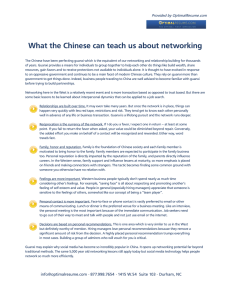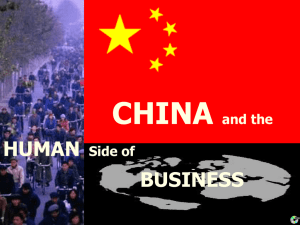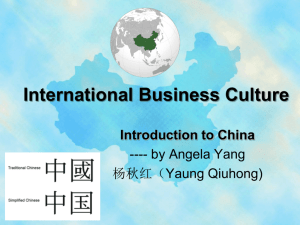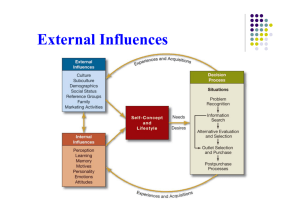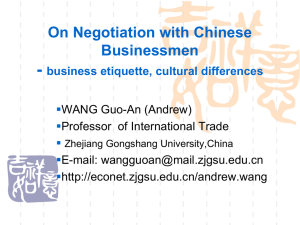The Importance of Guanxi to Multinational Companies in China
advertisement
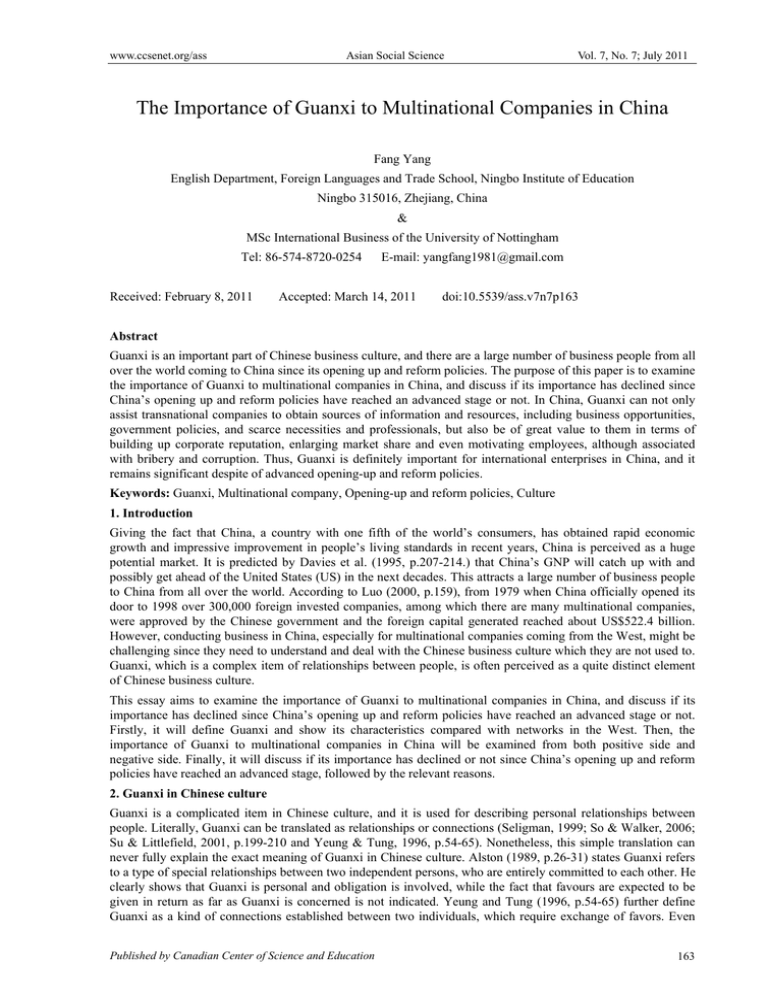
www.ccsenet.org/ass Asian Social Science Vol. 7, No. 7; July 2011 The Importance of Guanxi to Multinational Companies in China Fang Yang English Department, Foreign Languages and Trade School, Ningbo Institute of Education Ningbo 315016, Zhejiang, China & MSc International Business of the University of Nottingham Tel: 86-574-8720-0254 Received: February 8, 2011 E-mail: yangfang1981@gmail.com Accepted: March 14, 2011 doi:10.5539/ass.v7n7p163 Abstract Guanxi is an important part of Chinese business culture, and there are a large number of business people from all over the world coming to China since its opening up and reform policies. The purpose of this paper is to examine the importance of Guanxi to multinational companies in China, and discuss if its importance has declined since China’s opening up and reform policies have reached an advanced stage or not. In China, Guanxi can not only assist transnational companies to obtain sources of information and resources, including business opportunities, government policies, and scarce necessities and professionals, but also be of great value to them in terms of building up corporate reputation, enlarging market share and even motivating employees, although associated with bribery and corruption. Thus, Guanxi is definitely important for international enterprises in China, and it remains significant despite of advanced opening-up and reform policies. Keywords: Guanxi, Multinational company, Opening-up and reform policies, Culture 1. Introduction Giving the fact that China, a country with one fifth of the world’s consumers, has obtained rapid economic growth and impressive improvement in people’s living standards in recent years, China is perceived as a huge potential market. It is predicted by Davies et al. (1995, p.207-214.) that China’s GNP will catch up with and possibly get ahead of the United States (US) in the next decades. This attracts a large number of business people to China from all over the world. According to Luo (2000, p.159), from 1979 when China officially opened its door to 1998 over 300,000 foreign invested companies, among which there are many multinational companies, were approved by the Chinese government and the foreign capital generated reached about US$522.4 billion. However, conducting business in China, especially for multinational companies coming from the West, might be challenging since they need to understand and deal with the Chinese business culture which they are not used to. Guanxi, which is a complex item of relationships between people, is often perceived as a quite distinct element of Chinese business culture. This essay aims to examine the importance of Guanxi to multinational companies in China, and discuss if its importance has declined since China’s opening up and reform policies have reached an advanced stage or not. Firstly, it will define Guanxi and show its characteristics compared with networks in the West. Then, the importance of Guanxi to multinational companies in China will be examined from both positive side and negative side. Finally, it will discuss if its importance has declined or not since China’s opening up and reform policies have reached an advanced stage, followed by the relevant reasons. 2. Guanxi in Chinese culture Guanxi is a complicated item in Chinese culture, and it is used for describing personal relationships between people. Literally, Guanxi can be translated as relationships or connections (Seligman, 1999; So & Walker, 2006; Su & Littlefield, 2001, p.199-210 and Yeung & Tung, 1996, p.54-65). Nonetheless, this simple translation can never fully explain the exact meaning of Guanxi in Chinese culture. Alston (1989, p.26-31) states Guanxi refers to a type of special relationships between two independent persons, who are entirely committed to each other. He clearly shows that Guanxi is personal and obligation is involved, while the fact that favours are expected to be given in return as far as Guanxi is concerned is not indicated. Yeung and Tung (1996, p.54-65) further define Guanxi as a kind of connections established between two individuals, which require exchange of favors. Even Published by Canadian Center of Science and Education 163 www.ccsenet.org/ass Asian Social Science Vol. 7, No. 7; July 2011 though they have pointed out the involvement of mutual transactions, they fail to recognize its long-term focus which is a quite important element of Guanxi. A comparatively comprehensive concept of Guanxi is provided by Luo (2000), and he claims that Guanxi can be defined as a concept about interpersonal connections which imply continued exchanges of favours. Networks between firms play an important role in companies’ success anywhere all over the world, including western countries (Luo, 2000). However, Guanxi has its unique features compared with networks in the West. Guanxi is personal, reciprocal and more long-term orientated. The most distinctive characteristic of Guanxi is that it is completely personal. This is indicated by its definition which has been mentioned previously. Guanxi is perceived as a kind of relationships between two individuals, which clearly shows that Guanxi is personal. Davies et al. (1995, p.207-214) and So and Walker (2006) have proved that no corporation-to-corporation relationship can be found as far as Guanxi is concerned, even if Li and Wright (2000) take a different view, proposing that group connection is not excluded in Guanxi. Alston (1989, p.26-31) also explains that Guanxi networks are relationships between employees not companies, and they need to be re-established by the new personnel when employees move from one organization. With regard to networks in the West, in contrast, as Luo (2000) maintains that they mainly refer to organization-to-organization relationships. Furthermore, Guanxi is a kind of relationship which requires exchange of personalized favours (Lee et al., 2001, p.51-69). So and Walker (2006) simplifies this, saying if A has provided certain assistance or help to B it is expected that B will repay this to A in future, though they might not be exactly the same in terms of values. In other words, if A could not offer any favour to B, B will not do anything for A either. So and Walker (2006) also cite that not only the people who one knows but also the favours one has given are important to the person in China. This is agreed by Alon (2003), Buttery and Wong (1999, 147-155), Lee et al. (2001, p.51-69) and Seligman (1999), and they point out that reciprocal obligation is a significant component of Guanxi. However, networks in the West are impersonal, no social obligation and further exchanges of favours are expected, because they are firm-to-firm relationships rather than personal connections (Lee et al., 2001, p.51-69; Luo, 2000). Additionally, Guanxi is more long-term orientated than networks in the West. Lee et al. (2001, p.51-69) assume that individuals and parties involved in both Guanxi and western networks preserve their relationships and have long-term perspectives. However, Li & Wright (2000, p.369-378) argue that individuals involved in Guanxi are more patient for future gains than parties associated in networks in western cultures, and Guanxi usually is not established for immediate gain. Generally, Guanxi is created for long-term transaction rather than single trade activity. People might not even have a particular purpose for immediate gain when they cultivate Guanxi; however, they have the expectation for benefits which may be obtained in the future. Luo (2000) agrees, pointing out that Guanxi is a type of continual building network. Yeung and Tung (1996, p.54-65) claim that Guanxi refers to a connection which requires a long-term interaction. The research conducted by Li and Wright (2000, p.369-378) also proves that Guanxi is focusing on long-term gains instead of immediate favours. 3. The importance of Guanxi to multinational companies in China Guanxi, especially Guanxi with Chinese government, can assist transnational companies to obtain sources of information which mainly includes business opportunities and government policies (Davies et al., 1995, p.207-214). With regard to business opportunities, the stronger the Guanxi network of an enterprise is, the more opportunities it has or will have. Alon (2003) also recognizes this, pointing out that Guanxi plays an important role in acquiring business opportunities in China. For instance, when KFC opened its largest chain store in Tiananmen, Beijing, in 1987 its good Guanxi with Chinese central government helped them, to a large extent, to get the building permission (Luo 2000, p. 124). Furthermore, Guanxi is perceived as a significant way of keeping organizations updated with government policies, such as import regulations and export restrictions. Davies et al. (1995, p.207-214) imply that Guanxi is a useful method for gathering information about government policies. Even, leaders of enterprises can use their Guanxi with relative government officials to influence government policy decision making (Gao & Tian, 2004, p.73-85). There is little doubt that this would make it easier for these companies to reach their business objectives. Therefore, Gao (2006, p.119-125) has come to the conclusion that Guanxi, good relationships with Chinese government in particular, is a necessary condition for international enterprises to do business successfully in China. Another benefit that multinational companies can obtain from Guanxi is getting access to sources of resources. As a result of the scarcity of some necessities and the shortage of professionals, organizations rely on Guanxi to get access to these resources in China (Thomas, 2002). Moreover, Davies et al. (1995, p.207-214) explain that 164 ISSN 1911-2017 E-ISSN 1911-2025 www.ccsenet.org/ass Asian Social Science Vol. 7, No. 7; July 2011 many production materials are under the control of local authorities, such as bricks, plaster and power equipment. In this regard, good relationship with relative government officials is definitely necessary for companies to make these resources obtained with higher efficiency. Furthermore, a strong Guanxi network also can lead to a reliable supply of common production materials which is vital for a manufacturer’s success. For example, Shanghai Volkswagen (SVW), which is a joint venture signed between Volkswagen AG and a group of Chinese partners, has established good relationship with its suppliers; therefore, they can get required parts with high quality and urgent shipment from its suppliers, which contribute to the success of SVW to a certain extent (Luo 2000, p. 129). There are some other benefits international enterprises can get from Guanxi, which are building up corporate reputation, enlarging market share and even motivating employees. Fan (2007, p.499-510) declares that Guanxi is quite important for building up corporate reputation since using Guanxi to promote an organization and its products is likely to be effective and successful. It is also indicated by Davies et al. (1995, p.207-214) that Guanxi can assist companies in building up their images. For instance, positive programs about an organization on TV will likely enhance its corporate reputation, and this can be achieved in a more effective way if they have Guanxi with people related. Dunfee and Warren (2001, p.191-204) report Guanxi is an effective way to obtain new customers and maintain existing buyers. That is, Guanxi can be used to extend a company’s market share. Similarly, Szeto et al. (2006, p.425-438) recognize that the most effective marketing can be secured by Guanxi. In addition, it is believed that positive relationships between employees in a company can be motivation to work. Luo (2000) reports the success of Sony in China, to a large extent, is based on its harmonious internal company relationships which refer to good Guanxi between people who are working in Sony. Thus, these benefits of Guanxi have clearly shown that business processes can be eased and business efficiency can be improved by Guanxi in China. On the other hand, it is perceived that Guanxi is associated with bribery and corruption although multinational companies can get many benefits from it. Both Luo (2000) and Norton (2006, p.22-27) mention that business organizations spend a large amount of money on bribes in China, and corruption is one of the main factors which have affected China’s development for many years. Lee et al. (2001, p.51-69) agree, pointing out that association with corrupt behaviour is the main negative aspect of Guanxi in China. Organizations may give money to people who have the power to offer immediate or future favours to them so as to establish Guanxi with those people. From another point of view, some business people might provide special benefit to someone who has Guanxi with them by misusing their power to obtain personal gain, especially monetary gain, in return. In this way, Guanxi is associated with corruption and bribery. Given the fact that the Chinese government pays high attention to bribery and corruption, business found involved with these activities would be punished (Luo, 2000). Moreover, Norton (2006, p.22-27) reports if the multinational companies listed in the US capital markets involve in bribery, such as cash payment in a red envelope, they will be severely punished by the Foreign Corrupt Practices Act (FCPA). For instance, Diagnostic Products Corp. which is a California-based manufacturer of medical equipment was fined 4.8 million dollars by the FCPA in May 2005 and it was also required to deliver up all of the gross profit, which is net profit plus interest, generated by its Chinese subsidiary to the US government over the following ten years, because its Chinese subsidiary had paid bribes to some Chinese doctors and hospital administrators (Norton 2006, p. 23). In addition, if any international enterprise is found involving in bribery and corruption, the company’s reputation will drop sharply, large numbers of customers will be lost and then it will become uncompetitive in the market. All these imply that international enterprises, especially non-Chinese multinational companies which do not have a full understanding about Chinese business culture, should carefully handle the special item of Guanxi. Given the fact that multinational companies can derive many benefits from Guanxi and they can also be negatively affected by Guanxi, Guanxi is definitely important for those international enterprises which are doing business in China. However, many scholars argue that the importance of Guanxi to multinational companies in China has decline since Chinese opening-up and reform policies have reached an advanced stage. Has it really declined? 4. Has the importance of guanxi to multinational companies in China declined? Notwithstanding the fact that many scholars assume that the importance of Guanxi to multinational companies In China has declined because of advanced opening-up and reform policies, it is believed that it remains significant. Xin and Pearce (1996) propose that the absence of the rule of law is the main reason why Guanxi plays a quite important role in doing business in China. Vanhonacker (2004, p.48-53) also presumes that the importance of Guanxi for business organizations in China would decrease as China becomes modern and open, and well developed in terms of its legal framework. Tian (2007) refutes that how the people in power interpret laws and Published by Canadian Center of Science and Education 165 www.ccsenet.org/ass Asian Social Science Vol. 7, No. 7; July 2011 regulations is more important than the laws and regulations themselves in China. That is, the people who have certain authority, especially government officials, can have great influence on doing business in China. This forces organizations, including multinational companies, to pay serious attention to establishing and maintaining Guanxi with those people in order to ease their business operations. In addition, So and Walker (2006) assume that decentralization which is caused by reform policies has led to declined importance of Guanxi with government officials. Even though reform makes the central government have less direct involvement in the running of the economy and provide more autonomy and power to local governments, this does not mean that the importance of Guanxi with government officials has declined. Instead, decentralization makes building up and maintaining Guanxi with local government officials more important since they have more power than before; with regard to Guanxi with officials in the central government, its importance might decrease to a certain extent as these officials have less impact on business organizations than before; so, in general, Guanxi with government officials, including those working in the central government and local governments, remains significant for doing business in China (Luo, 2000). Gao (2006, p.119-125) states that government officials still have considerable power in projects approvals and resources allocation, and researches have shown that Chinese government and the Communist Party still have the greatest impact on multinational companies’ business operation in China. Fan (2007, p.499-510) claims as a result of decentralization Guanxi with government officials may become even more complicated and confused for non-Chinese multinational companies because they need to deal with officials at different levels who are ruled by varied Guanxi networks. Moreover, it is believed that the continuing importance of Guanxi in Hong Kong and Taiwan where the legal system has been well developed is the best proof for the continuing importance of Guanxi for doing business in China. For instance, owners of different banks in Hong Kong, including Chinese, non-Chinese and merged banks, stated that building up Guanxi with customers is their approach to deal with business in Hong Kong (Gilbert & Choi, 2003, p.137-146). Lin et al. (2006, p.81-93) further state that Guanxi can assist enterprises in getting more consumers in Taiwan. All these clearly show that Guanxi still plays a significant role in doing business in China, including Hong Kong and Taiwan both of which are modern, open and rule of law societies. 5. Reasons for the continuing importance of Guanxi to multinational companies in China First of all, Guanxi is deeply rooted in Chinese culture, so it remains important to multinational companies in China. Dunfee and Warren (2001, p.191-204) declare that Guanxi is a cultural phenomenon in China, and it plays an important role in Chinese society. Chinese culture is greatly influenced by Confucianism which emphasizes group identity and long-term personal relationships. According to Hofstede (2001), Chinese culture should be described as collectivism and long-term time orientation. Ng et al. (2007, p.164-180) further explain that collectivist culture refers to a culture where close interpersonal connection is preferred and individuals take care of relatives and members of social groups which they belong to, and long-term time orientated culture means that people have long-term perspective instead of short-term focus. This clearly shows that the value of long-term personal relationships is an element of Chinese culture. That is, Guanxi is a part of Chinese culture and it reflects the values and behaviours shared by Chinese people. Fan (2007, p.499) states that Guanxi is an important component of Chinese culture so China is a Guanxi-based society despite its advanced opening-up and reform policies. Tian (2007) also recognizes this, pointing out that Guanxi has a long history in China and it is rooted in traditional Chinese culture. Therefore, it is impossible that the importance of Guanxi would have declined in the past decades. Also, the development in information technology (IT) has facilitated interpersonal communication which is essential for building up Guanxi (Tian, 2007); it is believed that this is another reason for the continuing importance of Guanxi to multinational companies in China. The advanced IT in contemporary China enables people to effectively communicate with their family and friends through different ways, such as mobile telephones and the internet. However, at the early time of China’s opening-up there were not so many people who had the ability to use advanced IT, and also IT at that time was not so well developed as it is today. According to Trappey and Trappey (2001, p. 202), the sales of personal computer were increasing by 60 percent per year from 1993 to 1999 in China. This implies that more and more people begin to use personal computers as a tool for personal communication in China. Tian (2007) further claims that advanced IT also makes exchange of favours between individuals, which is an essential element of Guanxi, easier and more convenient. Then, the increasing competition faced by international enterprises in China is perceived as another force for the continuing importance of Guanxi. Fan (2007, p.500) reports that multinational companies faced little or no competition when they first entered Chinese market in the later 1970s and early 1980s; however, they have been facing increasing competition since late 1990s. In the late 1970s and early 1980s when China just carried out its opening-up and reform policies there were not so many international enterprises investing in China. After two 166 ISSN 1911-2017 E-ISSN 1911-2025 www.ccsenet.org/ass Asian Social Science Vol. 7, No. 7; July 2011 decades’ reform, China’s economy is growing fast, it is perceived as a huge potential market and more and more multinational companies begin to invest in China. This makes the competition is becoming more and more intense. Thus, in order to increase corporate reputation, enlarge market share and become more competitive in the market multinational companies have to work harder to establish or maintain their Guanxi networks in China. Finally, the shift from Sino-foreign joint ventures to wholly foreign-owned enterprises is another reason why Guanxi remains significant for multinational companies in China. Luo (2000) notes China officially opened its door to foreign organizations in 1979 but it is based on the condition of a joint-venture law. This means that the only way non-Chinese multinational companies can invest in China at the early period of China’s opening-up is setting up joint-ventures with Chinese partners. So, the majority of multinational companies which entered Chinese market were joint-ventures signed with Chinese partners until the early 1990s, for instance, Shanghai Volkswagen (SVW) which is a joint venture signed between Volkswagen AG and a group of Chinese partners in 1984 (Liu & Roos, 2006, p.432-445). In this way, these multinational companies can get assistance from their Chinese partners in terms of understanding Chinese business culture including Guanxi. Furthermore, their Chinese partners will provide them with some Guanxi which their partners currently have and their partners will also assist them in establishing new Guanxi networks. However, since the early 1990s most multinational companies have gradually transferred from Sino-foreign joint ventures to wholly foreign-owned enterprises and the majority of new foreign investment has also been wholly foreign-owned enterprises (Liu & Roos, 2006, p.432-445). Without a Chinese partner, multinational companies must deal with Guanxi by themselves. Therefore, international enterprises must put more effort in building up and maintaining Guanxi with relevant people in China. 6. Conclusion From the perspective of multinational companies Guanxi plays an important role in doing business in China and it remains significant notwithstanding the advanced opening-up and reform policies. This paper has introduced Guanxi in details and highlighted its importance to multinational companies in China from both positive and negative side. These importances can be summarized as getting access to sources of information and resources, building up a company’s reputation, enlarging market share, motivating employees and its association with bribery and corruption. Many scholars argue that the importance of Guanxi has declined since China’s opening-up and reform policies have reached an advanced stage. So, this paper has also discussed whether the importance of Guanxi to multinational companies in China has declined or not. It reached to the conclusion that Guanxi remains significant for international enterprises doing business in China. It finally analyzed the reasons for the continuing importance of Guanxi to multinational companies in China, and these included cultural factor, development in IT, increasing competition and transition from Sino-foreign joint ventures to wholly foreign-owned enterprises. These imply that multinational companies in China should pay high attention to Guanxi and put effort in building up and maintaining their Guanxi networks. Therefore, it is felt that detailed methods on how to establish and maintain Guanxi for multinational companies in China which have not been covered in this paper can be done through further work. This would provide multinational companies in China with a basic direction on how to cultivate Guanxi in China. References Alon, I. (ed.) (2003). Chinese culture, organizational behavior, and international business management. London: Praeger Publishers. Alston, J. P. (1989). Wa, Guanxi, and Inhwa: Managerial principles in Japan, China & Korea. Business Horizons, 32(2):26-31. [Online] Available: http://www.sciencedirect.com. Buttery, E. A., & Wong, Y. H. (1999). The development of a Guanxi framework. Marketing Intelligence & Planning, 17(30):147-155. [Online] Available: http://www.emeraldinsight.com. Davies, H., Leung, T. K. P., Luk, S. F. K., & Wong, Y. (1995). The benefits of “Guanxi”: The value of relationships in developing the Chinese market. Industrial Marketing Management, 24(3):207-214. [Online] Available: http://www.sciencedirect.com. Dunfee, T. W., & Warren, D. E. (2001). Is Guanxi Ethical? A Normative Analysis of Doing Business in China. Journal of Business Ethics, 32, 191-204. Fan, Y. (2007). “Guanxi”, government and corporate reputation in China: Lessons for international companies. Marketing Intelligence & Planning, 25(5):499-510. [Online] Available: http://www.emeraldinsight.com. Gao, Y. Q., & Tian, Z. L. (2004). How Firms Influence the Government Policy Decision-making in China. Singapore Management Review, 28(1):73-85. Published by Canadian Center of Science and Education 167 www.ccsenet.org/ass Asian Social Science Vol. 7, No. 7; July 2011 Gao, Y. Q. (2006). Building Guanxi with Government for Foreign Companies in China: A Case Study on the Application of Commitment Instrument. The Business Review, 6(2):119-125. Gilbert, D. C., & Choi, K. C. (2003). Relationship marketing practice in relation to different bank ownerships: a study of banks in Hong Kong. International Journal of Bank Marketing, 21(3):137-146. [Online] Available: http://www.emeraldinsight.com. Hofstede, G. (2001). Culture’s Consequences: Comparing Values, Behaviors, Institutions, and Organizations Across Nations. The United States of America: SAGE Publications. Lee, D. J., Pae, J. H., & Wong, Y. H. (2001). A model of close business relationships in China (guanxi). European Journal of Marketing, 35 (1/2):51-69. [Online] Available: http://www.emeraldinsight.com. Li, J., & Wright, P. C. (2000). Guanxi and realities of career development: a Chinese perspective. Career Development International, 5(7):369-378. [Online] Available: http://www.emeraldinsight.com. Lin T. M. Y., Wu, H. H., Liao, C. W., & Liu, T. H. (2006). Why are some e-mails forwarded and others not?. Internet Research, 16(1):81-93. [Online] Available: http://www.emeraldinsight.com. Liu, H., & Roos, L. U. (2006). Managing strategic planning paradigms in China. Marketing Intelligence & Planning, 24(5):432-445. [Online] Available: http://www.emeraldinsight.com. Luo, Y. D. (2000). Guanxi and Business. Singapore: World Scientific. Ng, S. I., Lee, J. A., & Soutar, G. N. (2007). Are Hofstede's and Schwartz's value frameworks congruent?. International Marketing Review, 24(2):164-180. [Online] Available: http://www.emeraldinsight.com. Norton, P. M. (2006). The Foreign Corrupt Practices Act Dilemma: US companies in China must walk a fine line to comply with US law while following common Chinese business practices. China Business Review, 39, 22-27. Seligman, S. D. (1999). Chinese business etiquette: a guide to protocol, manners, and culture in the People’s Republic of China. New York: Warner books. So, Y. L., & Walker, A. (2006). Explaining Guanxi: the Chinese business network. London: Eoutledge. Su, C., & Littlefield, J. E. (2001). Entering Guanxi: A Business Ethical Dilemma in Mainland China?. Journal of Business Ethics, 33(3):199-210. [Online] Available: http://www.springerlink.com. Szeto, R., Wright, R. C., & Cheng, E. (2006). Business networking in the Chinese context: Its role in the formation of guanxi, social capital and ethical foundations. Management Research News, 29(7):425-438. [Online] Available: http://www.emeraldinsight.com. Thomas, G. (ed.) (2002). Social Connections in China: Institutions, Culture, and the Changing Nature of Guanxi. Cambridge: Cambridge University Press. Tian, X. W. (2007). Managing International Business in China. Cambridge: Cambridge University Press. Trappey, C. V., & Trappey, A. J. C. (2001). Electronic commerce in Greater China. Industrial Management & Data Systems, 101(5):201-210. [Online] Available: http://www.emeraldinsight.com. Vanhonacker, W. R. (2004). Guanxi Networks in China: How to be the spider, not the fly. The China Business Review, 48-53. Xin, K. R., & Pearce, J. L. (1996). Guanxi: connections as substitutes for formal institutional support. Academy of Management Journal, 39(6):1641-58. Yeung, I. Y. M., & Tung, R. L. (1996). Achieving Business Success in Confucian Societies: The importance of Guanxi (Connections). Organizational Dynamics, 25(2):54-65. [Online] Available: http://www.sciencedirect.com. 168 ISSN 1911-2017 E-ISSN 1911-2025
